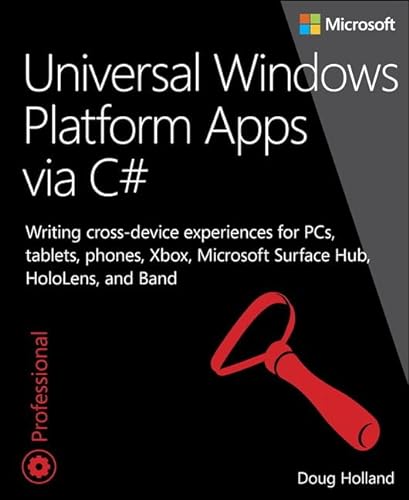Universal Windows Platform Apps via C#: Writing cross-device experiences for PCs, tablets, phones, Xbox, Microsoft Surface Hub, HoloLens, and Band (Developer Reference) - Softcover

Zu dieser ISBN ist aktuell kein Angebot verfügbar.
Alle Exemplare der Ausgabe mit dieser ISBN anzeigen:
Reseña del editor:
Developers are increasingly being tasked with developing apps for multiple platforms while technology books typically address each platform in isolation. This book will be the first of its kind to illustrate how code can be shared between Windows 10, Windows Phone 10, and Xbox One.[1] With Windows 10 developers write apps for one product family against one developer platform accessible from one store. Windows 10 represents huge opportunities for developers and using shared code reduces both the investment required to adopt the platform as well as the time to market. The book will explore several strategies for sharing code with both a detailed explanation of the 'why' accompanied with end-to-end examples that demonstrate the 'how.' Where there is more than one way to approach a given problem, the trade-offs between various approaches will be discussed and illustrated in samples. Key topics include: Application Architecture: An application exhibits an architecture whether planned or unplanned. If an application is architected well, it will lend itself naturally to code sharing. If not, architectural refactorings may be necessary and such refactorings will also be discussed within the book. Strategies for Code Sharing: While other strategies for code sharing may be discussed in the book, the book will largely focus on Visual Studio 2015 UAP and Universal projects, Portable Class Libraries, Windows Runtime Components, and 3) Visual Studio's Add as Link capability. Portable Code: Portable Code is .NET based code that is portable across one or more target frameworks. Windows Store and Windows Phone apps are two such target frameworks. Shared Code: Windows and Windows Phone Runtime components are not binary-compatible, but rather are different projects built using shared code. At the time of writing Windows Phone Runtime components can only be written in C++ while Windows Runtime Components can be written in C++, C#, and VB. Dependency Injection: Dependency Injection or Inversion of Control (IOC) techniques are extremely useful when writing applications across Windows and Windows Phone (and likely Xbox One too). These techniques allow abstractions of platform specific capabilities to be implemented in portable or shared code. Concrete implementations of these abstractions are then implemented for each specific platform. The author used this technique in the MSDN Magazine article on shared code: http://msdn.microsoft.com/en-us/magazine/dn201744.aspx
Biografía del autor:
Doug Holland is an architect evangelist with substantial experience in Microsoft .NET technologies and recognized as an influential contributor to the .NET community. He holds a Master's Degree in Software Engineering and has been a software architect for Fortune 500 companies.
„Über diesen Titel“ kann sich auf eine andere Ausgabe dieses Titels beziehen.
- VerlagMicrosoft Press,U.S.
- Erscheinungsdatum2016
- ISBN 10 073568412X
- ISBN 13 9780735684126
- EinbandTapa blanda
- Anzahl der Seiten256
(Keine Angebote verfügbar)
Buch Finden: Kaufgesuch aufgebenSie kennen Autor und Titel des Buches und finden es trotzdem nicht auf ZVAB? Dann geben Sie einen Suchauftrag auf und wir informieren Sie automatisch, sobald das Buch verfügbar ist!
Kaufgesuch aufgeben